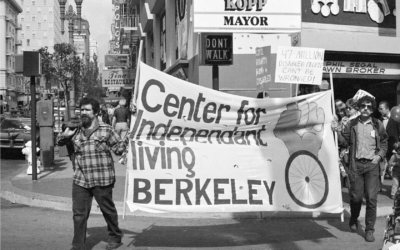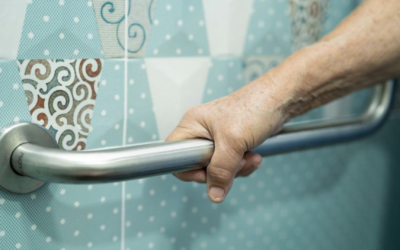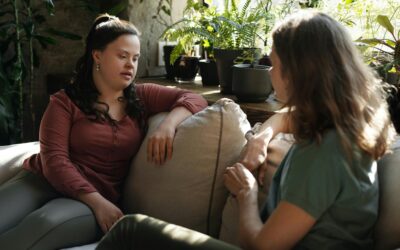March is Brain Injury Awareness Month. Living with a brain injury is challenging. Each individual’s case is unique, and for this reason, there is no one-size-fits-all solution for people to move on with their lives once they are faced with a new disability. There are 5.3 million people living with a permanent brain injury-related disability, or 1 in 60 people. An estimated 20 to 30 percent of people with brain injuries are discharged from hospitals directly to nursing homes, without necessarily having a choice or the resources to remain independent. For many, this can feel like the end of the road, and because of their disability, they will be forced to live out the rest of their days in a care facility.
But not everyone. Jenn Ochs, Ms. Wheelchair Colorado 2023, is overcoming the barriers faced due to disability, and using her life as a platform to educate others about they can live independently. Her own story is proof that it’s possible to live independently with a brain injury, and she has dedicated herself to addressing the current national care worker crisis and being an advocate for independent living. Jenn’s Story
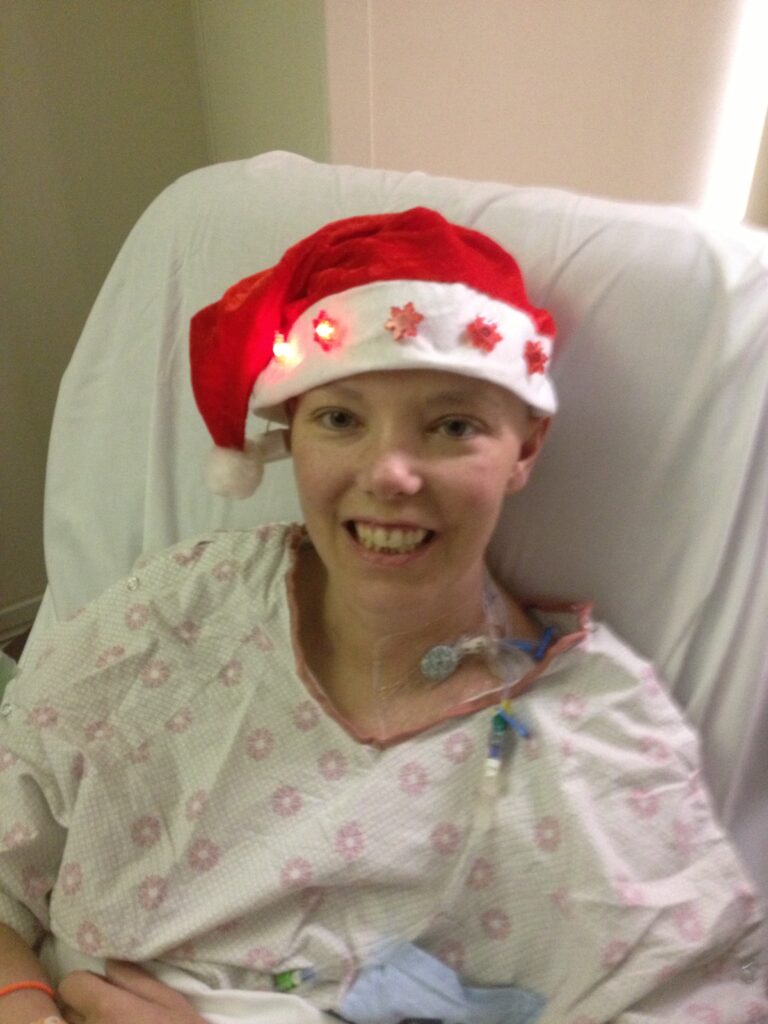 In 2010, Jenn Ochs was diagnosed with Acute Myeloid Leukemia, which is a cancer of the blood and bone marrow. The doctors were confident they could cure her. But they discovered that because she has a specific gene, if the leukemia came back after treatment, it would come back with increased severity. So her oncologist recommended a bone marrow transplant. After her transplant and subsequent checkups, Jenn was declared cancer free. Her doctors gave her hope that she would go on to live a long happy life. What she wasn’t prepared for was the cascade of issues that would follow and reshape her life in ways she couldn’t imagine.
In 2010, Jenn Ochs was diagnosed with Acute Myeloid Leukemia, which is a cancer of the blood and bone marrow. The doctors were confident they could cure her. But they discovered that because she has a specific gene, if the leukemia came back after treatment, it would come back with increased severity. So her oncologist recommended a bone marrow transplant. After her transplant and subsequent checkups, Jenn was declared cancer free. Her doctors gave her hope that she would go on to live a long happy life. What she wasn’t prepared for was the cascade of issues that would follow and reshape her life in ways she couldn’t imagine.
In 2013, on a trip with her husband to visit her in-laws in New York, she had a sudden relapse and was rushed to the hospital. Doctors feared she would have total organ failure. She needed another bone marrow transplant to fight the aggressive leukemia that had returned. She was given high doses of chemotherapy to prepare for the transplant. But one night, on the way to the bathroom, Jenn collapsed on the floor and suddenly found herself unable to move well or speak clearly. The chemotherapy had given her cerebellum ataxia, a sudden, uncoordinated muscle movement resulting from injury to the cerebellum part of the brain. The doctors reassured her, telling her it would go away within 24 to 48 hours. But it never did. Suddenly, Jenn had a permanent disability, a brain injury.
Jenn ended up staying in the hospital in New York for more than 9 months. After the bone marrow transplant, she contracted a lung infection and was put in a medically induced coma for over a month. While in the coma, the doctors gave her a tracheotomy, which led to severe scarring and dilation in her esophagus. They tried to use a portion of her lower intestines to repair her esophagus, but the surgery resulted in an E-coli infection. As a result, the transplant was removed. Jenn can no longer swallow and must eat through a feeding tube.
In 2016, she and her husband divorced and she moved to Colorado to be closer to her mother. Jenn suffered from severe palsy and couldn’t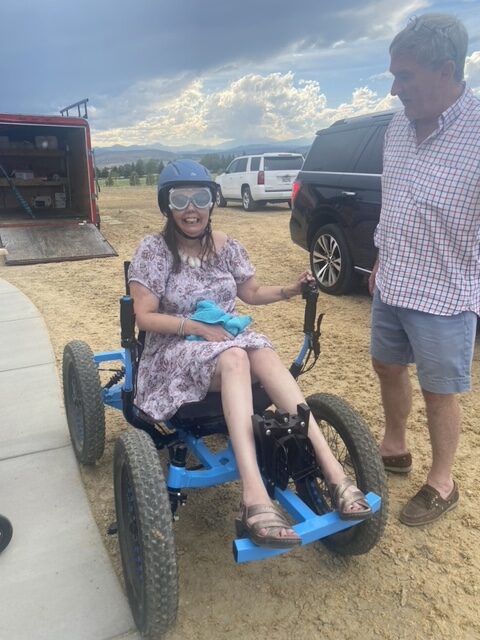 feed herself with the feeding tube. At the time, Medicaid and private insurance wouldn’t cover the cost of a caregiver. She and her mother searched for a nursing home, but most wouldn’t take her either because she had a feeding tube, or because she was only 34 and considered too young for nursing care. Eventually, her family found a nursing home in Boulder that would accept her.
feed herself with the feeding tube. At the time, Medicaid and private insurance wouldn’t cover the cost of a caregiver. She and her mother searched for a nursing home, but most wouldn’t take her either because she had a feeding tube, or because she was only 34 and considered too young for nursing care. Eventually, her family found a nursing home in Boulder that would accept her.
Sadly, the nursing home was so severely understaffed, they often forgot to feed her. It was then that Jenn began to understand the current care worker crisis. In order to avoid starvation, Jenn learned to feed herself. She soon realized this was a blessing in disguise. Once Jenn was able to feed herself, she qualified for independent living.
A case manager from CPWD helped her get on the waitlist for a program called Colorado Choice Transitions. This was a five-year grant program that helped members of Colorado’s Medicaid Program who lived in nursing and other long-term care facilities transition to living independently in the community using Home and Community-Based Services and supports. The grant for this program ended in 2018, but its services have now officially been added to Medicaid so it is no longer grant-dependent. The program had a directive called Money Follows the Person, to ensure funds went directly to people transitioning to independence, not organizations. With funds from this program, the CPWD case manager helped Jenn get set up in a new apartment with a proper bed, kitchen equipment, caregiving services, and everything she would need to live independently. She has been living on her own for four years.
Becoming Ms. Wheelchair Colorado
Jenn is a member of the Colorado Cross-Disability Coalition. They informed her about the Ms. Wheelchair Colorado competition. The competition is not a beauty contest, but rather based on advocacy and activism. Jenn decided she wanted to go for it and use her platform as Ms. Wheelchair Colorado to be a voice and advocate for independent living.
“There are so many resources that make it possible to live independently,” she said. “You don’t have to go to an institution or live with family. You can actually live on your own. I became disabled at 33. I had already been married, had a career, so it felt like my life was over. But independent living really taught me, no, it’s just a different life now, and it’s possible. I think people are really amazed about it, but really anyone can do it if they just take a chance and get the right resources.”
After the vigorous application process for Ms. Wheelchair Colorado, Jenn was thrilled when she discovered she won. At her crowning ceremony, she spoke about winning.
“You are more capable than you think”
“For many years I was not looking forward to a bright future,” she said. “But this opportunity has reminded me that determination and positivity will pull you through those dark times.”
Jenn’s motto is, “You are more capable than you think.”
She is now involved with Colorado Care Workers Unite (CCWU) which is an organization trying to unionize care workers to get them better pay and benefits.
“I promote independent living, but without reliable care workers, it’s not safe,” she explained. “Last year, my care worker fell ill and I couldn’t find a replacement for her. I had no care for over a month. Luckily I had friends and family step in to take care of me, but not everyone has that. That’s why I got involved with Colorado Care Workers Unite.”
Currently, the average care worker’s salary nationwide is only $16 per hour. That falls far short of the $20.25 per hour that is considered the living wage required for a single adult with no children to afford to live in Colorado.
“I’ve had many caregivers tell me that they feed their clients better food than they feed themselves,” said Jenn. “They tell me they live in their van. There are no real career prospects moving forward for these people. It’s a real crisis, and it’s only going to get worse if we don’t do something about it.”
 Jenn is using her platform as Ms. Wheelchair Colorado to support the Homecare Workers Bill of Rights, which was written by care workers from all over the state and presented to lawmakers in the fall, as well as again on March 21, 2023. The document calls for higher wages and benefits, protections against wage theft and harassment, and more “decision-making power” for home care workers. Fifty state legislators signed the bill in support in September. New legislation has resulted from this called The Home Care Workforce Stabilization Act. This is being sponsored by State Sen. Jessie Danielson (D-Wheat Ridge) but has not yet been brought to the floor of the state House and Senate. The Bill will give care workers a seat at the decision-making table to address widespread issues such as poverty wages, law-breaking employers, lack of benefits such as health insurance and vacation time, and sexual harassment.
Jenn is using her platform as Ms. Wheelchair Colorado to support the Homecare Workers Bill of Rights, which was written by care workers from all over the state and presented to lawmakers in the fall, as well as again on March 21, 2023. The document calls for higher wages and benefits, protections against wage theft and harassment, and more “decision-making power” for home care workers. Fifty state legislators signed the bill in support in September. New legislation has resulted from this called The Home Care Workforce Stabilization Act. This is being sponsored by State Sen. Jessie Danielson (D-Wheat Ridge) but has not yet been brought to the floor of the state House and Senate. The Bill will give care workers a seat at the decision-making table to address widespread issues such as poverty wages, law-breaking employers, lack of benefits such as health insurance and vacation time, and sexual harassment.
As Ms. Wheelchair Colorado, Jenn will be traveling to all the Centers for Independent Living in Colorado. She will be going to Grand Rapids, Michigan in August to compete for Ms. Wheelchair America in the hope that she can win and bring her voice advocating the Independent Living Movement nationwide.
Jenn is an inspiration to everyone. She has faced adversity and come through the other side with a new purpose in life to help others believe in their own abilities and potential. CPWD supports Jenn on her mission to be a voice of the Independent Living Movement.



